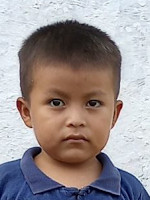

Birthday
December 9, 2019
Age
Age: 5
Gender
Boy


Alberto is 5 years old and lives in Guatemala.
I live with my mother and father in the Panzós area. The primary language where I live is Spanish. My father is sometimes employed as a farmer. I like art and/or drawing, group games, hide and seek and jumping. My favourite activity at church is Vacation Bible School. My favourite activity at the centre is learning about God. I am not attending school because I am too young.
Mountains and rugged highlands dominate much of Guatemala's landscape. The Pacific plain is a narrow belt between mountains and the ocean. In the southern highlands, the most populous region is Guatemala City and to the north is jungle.
More than half of Guatemalans descend from Mayan peoples and reflect the culture of their ancestors. The great Mayan empire flourished throughout much of Guatemala for over a thousand years but entered a period of decline and political turmoil from the 11th to the 15th century. When the Spanish conquistadors arrived in 1523, the remaining cities and kingdoms were quickly conquered. In 1821, the country gained independence from Spain. Since then, Guatemala's politics have been marked by rivalries and insurgencies. After a series of coups, short-lived rulers and ever-increasing protests and repression, civil war erupted in the 1960s and lasted until a peace accord was signed in 1996. Since then, Guatemala has seen increased economic and political stability but continues to struggle with political discontent, crime and poverty.

Compassion’s ministry is focused on what we call holistic child development. This means developing children in all the different aspects of their lives—their minds, bodies and relationships—while giving them the opportunity to hear about and experience the love of Jesus from caring local church staff and volunteers.
Absolutely not! We encourage children and families of all faiths and backgrounds to register in our programs and would never require or coerce anyone to convert to Christianity.
Learn MoreToday, children around the world are discovering that poverty doesn’t have to be their future. Help one more do the same by sponsoring with Compassion!

While we're sorry you could not sponsor this specific child, we would love to help you find a different child to sponsor.
Age: